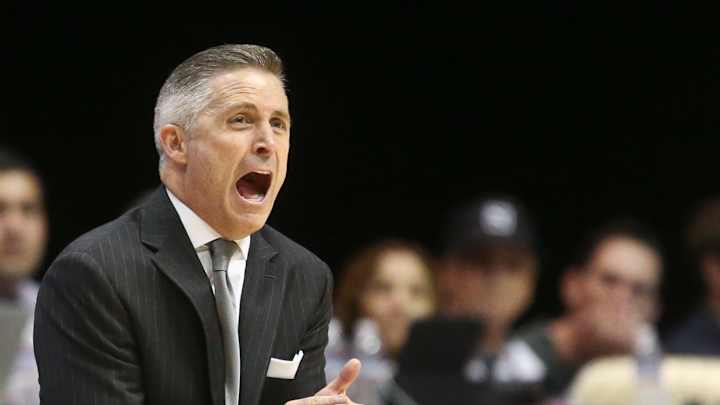Georgia Tech fires men's basketball coach Brian Gregory

ATLANTA (AP) Georgia Tech's strong finish to the season wasn't enough to convince athletic director Mike Bobinski that Brian Gregory could bring bigger success in the future.
Georgia Tech fired Gregory on Friday, less than 48 hours after another disappointing season ended in the NIT.
Bobinski, who said he had studied the decision ''basically every minute of every day for some period of time,'' delivered the news to Gregory late Friday afternoon.
''At the end of the day the evaluation for me came down to what does the future look like,'' Bobinski said. ''Do we in fact have a clear path forward to greater success and higher levels of success in the years ahead and my determination was I didn't see it. I ultimately didn't see it and ultimately led me to the decision that we needed to make a change.''
Gregory was dismissed with an overall record of 76-86, which included a dismal 27-61 mark in the Atlantic Coast Conference. He built this season's roster heavily around transfers but fell short the NCAA Tournament spot that might have saved his job.
''It's hard to deny that would have given us a different thought,'' Bobinski said in a news conference.
Georgia Tech finished 21-15, winning eight of its last 11 with its first postseason appearance in Gregory's five years. Bobinski saw a major rebuilding job ahead following the departures of five seniors, including top scorers Marcus Georges-Hunt and Adam Smith.
''We clearly were heavily reliant on guys that will be moving on and that was part of my thinking as I looked ahead,'' Bobinski said.
Gregory almost was fired after the Yellow Jackets finished 12-19 overall and 3-15 in the ACC last season.
The Yellow Jackets won a pair of NIT games before losing at San Diego State 72-56 on Wednesday night, one win short of reaching the semifinals in New York.
Bobinski said another win for Gregory ''would have made an already sticky situation every stickier because of who Brian is and the way he conducts our program.''
Gregory, 49, acknowledged that this season was a disappointment after the Yellow Jackets missed out on an NCAA bid.
''I'm not going to sugarcoat it,'' Gregory said last week. ''I wish we were playing (in NCAA) and had an opportunity.''
Georgia Tech's financially strapped athletic program will owe Gregory more than $1.3 million for the final two years of his contract. The school is still owes his predecessor, Paul Hewitt, $2.7 million over the next three years - the remainder of a $7.2 million buyout he received after being fired in 2011. That means the Yellow Jackets will be paying three coaches after they hire Gregory's successor.
The financial strain also was impacted by dwindling attendance at McCamish Pavilion and the clear disgruntlement of big-money boosters. This season's average home attendance was 5,993, down from last season's average of 6,201.
Bobinski said finances are always a factor but ''we're not going to be constrained by that in our search.''
Gregory previously coached at Dayton, where he went 172-94 in eight seasons and guided the Flyers to a pair of NCAA Tournament bids.
Georgia Tech hasn't been to the NCAAs since 2010 and has made only one appearance in the last nine years.
Georgia Tech was a perennial national contender in the 1980s and `90s under Bobby Cremins, who lured dynamic players such as Mark Price, John Salley, Kenny Anderson, Dennis Scott and Stephon Marbury to Atlanta.
The Yellow Jackets began to fade, however, and Cremins agreed to step down after the 1999-2000 season. His successor, Hewitt, was hailed as a rising star in the college coaching ranks after Georgia Tech advanced all the way to the 2004 NCAA title game in San Antonio before losing to Connecticut, the deepest tournament run in school history.
Georgia Tech's next coach will inherit a program with plenty of selling points.
The school totally rebuilt its arena, moving into 8,600-seat McCamish Pavilion in 2012, to go along with a state-of-the-art practice facility. The campus is located in the heart of Atlanta - an enticing urban setting for recruits - and the state of Georgia has an abundance of high school talent, much of it right within the sprawling metro area.
''That's part of what you look for in a new head coach and coaching staff,'' Bobinski said, ''people that can tell that story in an effective way and get us on that radar of the young men that will be capable of taking us where we want to go.''
